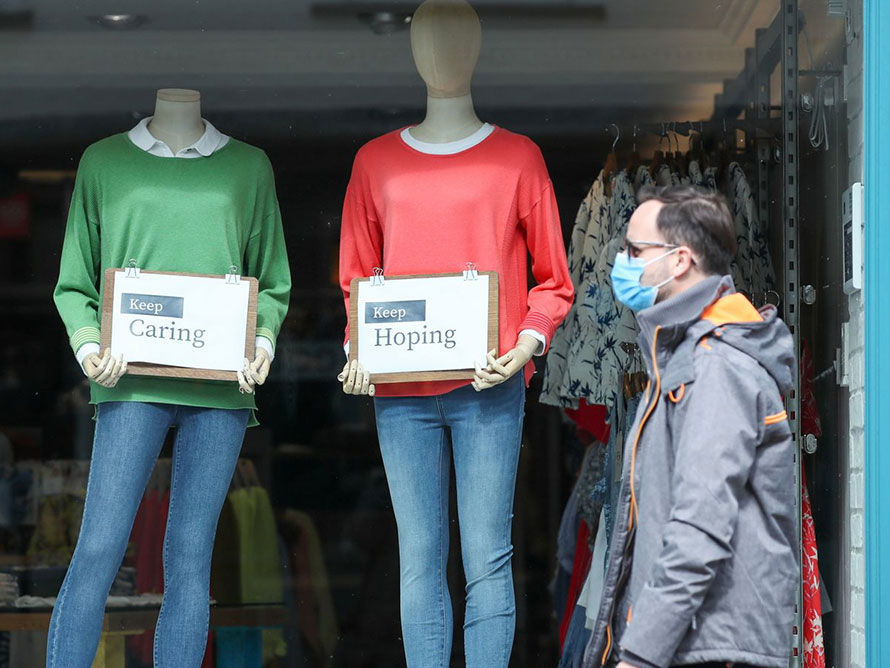Is this one of the greatest scientific achievements of all time? As the lockdown eases today, one group of experts says the UK has reached a major milestone in its fight against Covid-19. As dawn broke over England, the country awoke with a sense of anticipation rarely seen on a cold Monday morning. Shopkeepers hurried to throw open their shutters. On the streets of the capital, eagle-eyed Londoners watched as restaurateurs filled the pavements with tables and chairs. By eight o’clock, queues of shaggy-haired folk, desperate to be free of their lockdown locks, were forming outside the salons. Just over a year ago, the sight of shoppers milling through the high streets, gym-goers diving into indoor pools and picnickers lazing in the park would not have made headline news. But today, after months of lockdown, the re-opening of England’s shops, restaurants, hairdressers and gyms is a vital step towards normality. “On Monday I will be going to the pub myself - and cautiously but irreversibly raising a pint of beer to my lips,” declared Boris Johnson last week. Today is undoubtedly an exciting day for millions of people across England – the Prime Minister included. But if one group of scientists is right, Monday may prove to be extraordinary for more than one reason. Last week, researchers at University College London made a stunning prediction: Britain will pass the threshold for herd immunity to coronavirus at some point today, 12 April. So what exactly does that mean? Herd immunity occurs when a high percentage of the population can no longer catch a disease – either because they have already had it, or because they are vaccinated. This makes it nearly impossible for the virus to spread. According to UCL’s model, by today, 73.4% of Britons will be protected from Covid-19. If the model is accurate, this means that deaths from coronavirus will continue to fall, never to rise again. “It would be an incredible prize, one of the greatest scientific achievements of our times,” writes journalist Fraser Nelson. “It’s not just possible, but probable.” Not everybody is convinced. Covid-19 is a new disease. The fight against it is a battle filled with countless unknowns. Scientists cannot say for certain how long immunity will last, nor if the vaccine will protect against variants. And other models are far more pessimistic than UCL’s - last week, advisers warned the government that easing restrictions was “highly likely” to lead to more deaths this summer. So far, the prime minister shows no signs of speeding up his lockdown roadmap. Still, whether herd immunity is reached today or not, one thing is clear: the UK is surging ahead in the worldwide race against the virus. From a peak of 1,820 on January 20, deaths have fallen by an incredible 95%. By the end of last week, nearly half of all Britons were vaccinated. Meanwhile, in Europe, many countries are lagging behind. France and Spain have vaccinated just 14% of their populations. Back in the UK, editor of The Spectator Fraser Nelson remains optimistic: “Herd immunity will (probably) arrive. Maybe not quite on Monday, but soon. And that ought to change everything.” Is this one of the greatest scientific achievements of all time? Road to freedom Of course, say some. The development of multiple vaccines within a year of the emergence of the new coronavirus, and the subsequent rollout across Britain, is clearly one of the most stunning human achievements of all time. It may not have been possible even two decades ago. Achieving herd immunity will spare countless lives and save the economy from untold damage. No other achievement can compare. Not necessarily, say others. Herd immunity will undoubtedly be a great scientific achievement, but whether or not it is one of the “greatest” is a more complex question. The discovery of electricity in the 1800s changed our lives forever. More recently, the internet overturned the global economy. And what about the humble lever – without which, the Egyptians could not have built the Pyramids? KeywordsVariants - Viruses mutate very fast, meaning that new varieties can evolve in a short space of time. The more infectious omicron variant of Covid-19 is currently causing fears of a resurgence of the disease.
Is this one of the greatest scientific achievements of all time? As the lockdown eases today, one group of experts says the UK has reached a major milestone in its fight against Covid-19.
Road to freedom
Keywords
Variants - Viruses mutate very fast, meaning that new varieties can evolve in a short space of time. The more infectious omicron variant of Covid-19 is currently causing fears of a resurgence of the disease.
Wave of optimism as herd immunity forecast

Glossary
Variants - Viruses mutate very fast, meaning that new varieties can evolve in a short space of time. The more infectious omicron variant of Covid-19 is currently causing fears of a resurgence of the disease.
